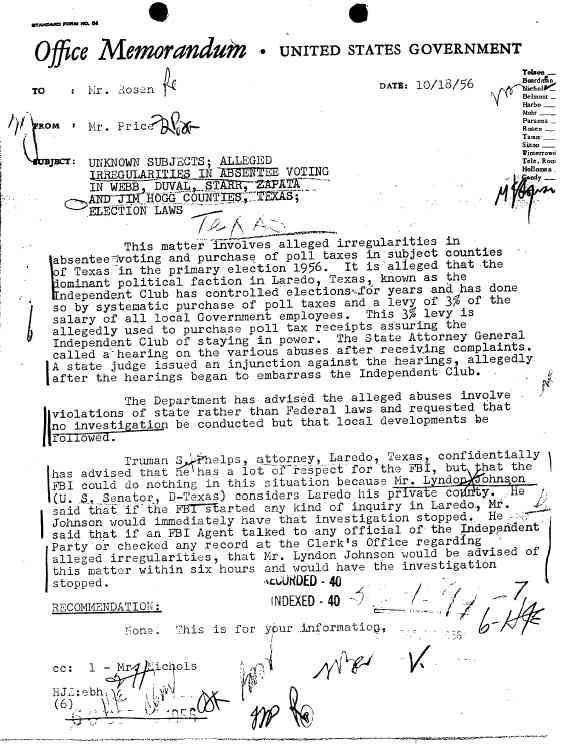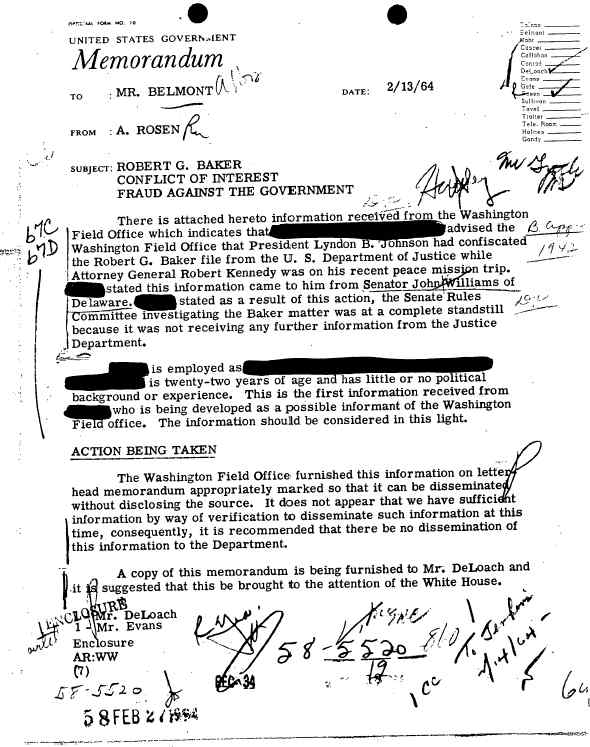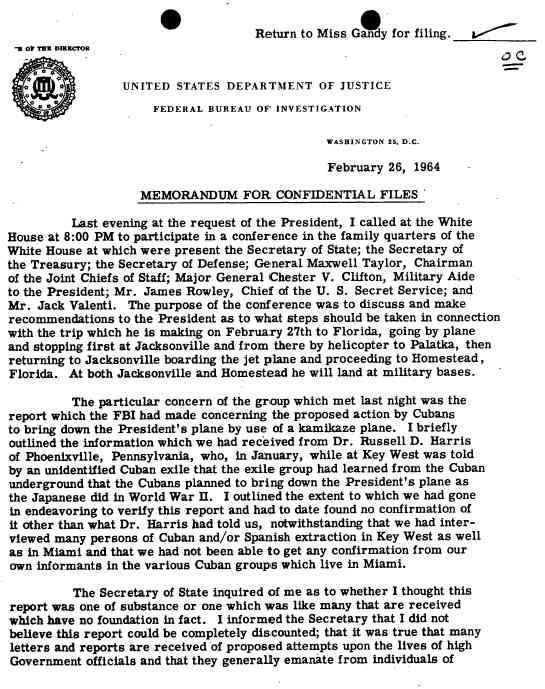|
President Lyndon B. Johnson
FBI - CIA Files - Telephone Conversation Recordings - Interview Transcripts
312 pages of FBI files, 42 pages of CIA files, 3 hours, 37 minutes of phone conversation recordings, and 229 pages of interview transcripts, covering President Lyndon Johnson.
Lyndon Baines Johnson was born on August 27, 1908 in Stonewall, Texas. While working as a janitor, he enrolled in Southwest Texas State Teachers College at San Marcos, Texas. In 1937, he was elected to the U.S. House of Representatives. In 1941, Lyndon Johnson lost a bid for the Senate by 1,311 votes to W. Lee "Pappy" O'Daniel. In 1948, Johnson ran for the Senate seat that O'Daniel was vacating. Johnson won the Democratic primary by 87 votes. Lyndon Johnson was elected to the Senate that fall. Senator Johnson became the youngest Senate majority leader in 1955. In the 1960 campaign, Johnson, as John F. Kennedy's running mate, was elected Vice President, in one of the closet presidential elections in United States history.
On November 22, 1963, Lyndon Baines Johnson became the 36th President of the United States, following the assassination of John F. Kennedy in Dallas, Texas. In a speech at the University of Michigan, May 22 1964, Johnson spoke of a "Great Society." He said, "The Great Society rests on abundance and liberty for all. It demands an end to poverty and racial injustice, to which we are totally committed in our time." The speech set the tone for the fall campaign. On July 2 1964, President Johnson signed the Civil Rights Act of 1964 in a televised ceremony at the White House. The far-reaching law included provisions to protect the right to vote, guarantee access to public accommodations, and withhold federal funds from programs administered in a discriminatory fashion.
On August 2, 1964, North Vietnamese torpedo boats attacked the destroyer USS Maddox in the Gulf of Tonkin. On August 4, a second North Vietnamese PT boat attack was reported on the USS Maddox and her escort, the USS C. Turner Joy, this time in poor weather. There would be debate, then and later, over whether the second attack actually occurred. President Johnson ordered retaliatory air strikes against North Vietnam after being given firm assurance that the attack did occur, and he sought a congressional resolution in support of his Southeast Asia policy. On August 7, with only two dissenting votes in the Senate and none in the House, Congress passed the Southeast Asia Resolution (often called the Gulf of Tonkin Resolution) backing him in taking "all necessary measures to repel any armed attack against the forces of the United States and to prevent further aggression." President Johnson signed the resolution on August 10.
On August 26, 1964, Lyndon Johnson was nominated for President of the United States, at the Democratic National Convention in Atlantic City, New Jersey. Hubert Humphrey was nominated for Vice President. On November 3, 1964, Lyndon Johnson was elected President of the United States with the greatest percentage of the total popular vote (61%) ever attained by a Presidential candidate. On March 31, 1968, President Johnson announced that he would not be a candidate for another term as President of the United States.
Following a short retirement, Lyndon Johnson died of a heart attack at his ranch on January 22, 1973.
FBI FILES
312 pages of FBI files dating from 1956 to 1966, covering Congressman Lyndon Johnson, Vice-President Lyndon Johnson, President Lyndon Johnson, and the Johnson Administration.
Topics covered in the files include: Alleged voting irregularities in the Texas counties of Webb, Duval, Starr, Zapata and Jim Hogg. The Billy Sol Estes Affair. Billy Sol Estes was an associate and neighbor of Lyndon Johnson. Billy Sol Estes was convicted in 1962 of fraud against the federal government. Information covering the Johnson radio and television holdings. Allegations that Johnson demanded kickbacks from insurance salesman Don B. Reynolds after buying a policy from him. The alleged kickbacks included a $585 Magnavox stereo and $1,200 of advertising on a Johnson owned Austin televison station, KTBC. Details of a conversation between FBI director J. Edgar Hoover and President Johnson, about developments in the Kennedy Assassination investigation. A range of issues involving the protection of the president.
Background checks on President Johnson Administration staff, including Pierre Salinger.
CIA FILES
42 pages of CIA files dating from1963 to 1968. Includes: Notes of meetings with President Johnson by CIA Director John McCone on subjects including Cuba, the role of the CIA, Vietnam War, and aerial reconnaissance. A memo reports information from an informant about a possible Vietnamese assassination squad assembled to kill President Johnson. A letter from Director of Central Intelligence Richard Helms to President Johnson about the possible effect of pending legislation on the CIA and the intelligence community
TELEPHONE CONVERSATION AUDIO RECORDINGS
3 hours and 37 minutes of FBI related phone conversations audio recorded by Lyndon Johnson. Conversations date from November 1963 to February 1967. Recordings of conversations between President Johnson and FBI Director J. Edgar Hoover, FBI Assistant Director and White House Liaison Cartha "Deke" DeLoach, Attorney General Robert Kennedy, Attorney General Nicholas Katzenbach, and Attorney General Ramsey Clark.
Subjects covered in the conversations include: President Kennedy assassination investigation. Jack Ruby. Protection of the president. Press leaks. Bobby Baker. Civil rights workers James Chaney, Andrew Goodman and Michael Schwerner murders in Mississippi. Race riots. Walter Jenkins scandal. Barry Goldwater. Warren Commission. Martin Luther King Jr. Murder of the civil rights worker Viola Liuzzo in Alabama. War on Poverty. New Orleans District Attorney James Garrison's investigation into President Kennedy's assassination.
INTERVIEW TRANSCRIPTS
229 Pages on interviews transcripts. Transcripts of interviews conducted by staff members of the Lyndon Johnson Presidential Libarary.
Interviews with: Cartha D. "Deke" DeLoach, Assistant to the Director, FBI, 1965-1970, one interview conducted on January 11, 1991. Nicholas deB. Katzenbach, Assistant Attorney General, 1961-1962; Deputy Attorney General, 1962-1964; Acting and later U.S. Attorney General, 1964-1966; Under Secretary of State, 1966-1969, three interviews conducted between November 12, 1968 and December 11, 1968. Ramsey Clark, U.S. Assistant Attorney General, 1961-1965; U.S. Deputy Attorney General, 1965-1966; U.S. Acting Attorney General, 1966-1967; U.S. Attorney General, 1967-1969, five interviews conducted between October 30, 1968 to June 3 1969.
|
|


